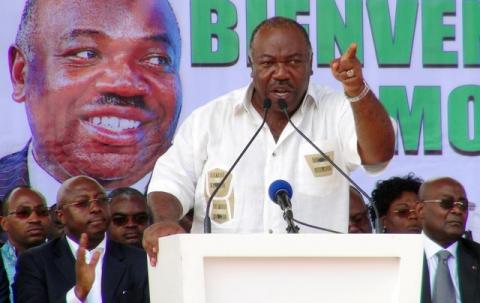Advertisement
Bongo seeks to prolong 50-year family rule in Gabon vote
LIBREVILLE (Reuters) - Voters in Gabon turned out for an election on Saturday that could mark the greatest challenge yet to President Ali Bongo, whose family has controlled the oil-producing central African nation for nearly half a century.
Bongo, 57, took over in 2009 when his father Omar died after 42 years in power, and he won a poll in the same year. With state machinery and entrenched patronage networks behind him, both lubricated by oil largesse, he is likely to win again this time.
Polls close at 6 p.m. (1300 ET) but results aren't expected until Monday or Tuesday. Land and sea borders were shut at midnight on Friday and will remain so until midnight on Saturday.
Bongo faces nine other candidates - compared with 22 in the last election - but his main rival is veteran diplomat Jean Ping. The ballot paper actually showed 11 names, but one of those, Roland Desire Aba'a, withdrew from the race two days ago.
Ping, 73, has harnessed discontent over a perceived failure to raise living standards, despite vast oil wealth spread over a population of less than two million.
"The Gabonese are suffering. We are not well paid, our children don't live in good conditions. That's why I voted for change," said Marie Ange N'no, 40, a civil servant outside a polling station in the capital Libreville, but she declined to say who she'd voted for.
Gabon, which has just rejoined OPEC after two decades, has a GDP per capita of $10,000 a year, making it one of the continent's richest countries, yet nearly a third of people live below its national poverty line.
"I want to launch a merciless fight against poverty," Bongo said on the outskirts of Libreville on Thursday.
"It must disappear from our country and I will not stop until we have achieved this."
But the country faces worsening fiscal woes owing to a long-term decline in oil output and a sharp fall in the price of crude over the past two years. Efforts to diversify into agriculture and tourism have yet to bear much fruit.
Oil wealth has flowed mostly to the elite -- for a period Gabon was the world's top per capita champagne importer -- trickling down only via its bloated civil service.
During his father's rule, Gabon was a pillar of "La Francafrique", an intricate, shadowy web of diplomacy, commerce and French military might that kept African autocrats in power and gave French companies privileged access to them.
Bongo has tried to shake off this legacy by presenting a modern face with a development program run by technocrats.
"As his son, it is difficult to present yourself as something new and technocratic when the whiff of corruption hangs over from the last administration," said Anthony Goldman, head of West Africa-focused PM Consulting.
Yet the opposition has focused on peddling slurs about whether Bongo is Gabonese or an adopted child from eastern Nigeria, a charge he denies. Tensions between the two camps could yet boil over into unrest.
The mixed-race son of a wealthy Chinese trader, Ping is a former foreign minister and African Union Commission chairman who was once close to Omar Bongo and even had a relationship with his daughter, Pascaline, fathering two children by her.
But he fell out with "Bongo Junior", as Gabonese call the president, leaving the ruling party in 2014 to become an outspoken critic.
Ping faces an uphill struggle, not least because Gabon's one-round system means the winner doesn't need a majority as long as he gets more votes than any others.
Last time Bongo won with just 41.73 percent of the vote.
(Writing by Tim Cocks; Editing by Susan Fenton)



















Add new comment